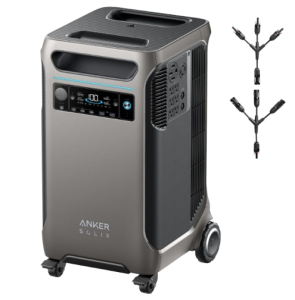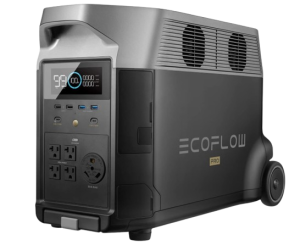
Anker Solix F3800 vs EcoFlow Delta Pro: Which Power Station Delivers More Value?

Portable power stations are changing how people manage energy for homes, road trips, and emergencies.
The Anker Solix F3800 and EcoFlow Delta Pro stand out as two of the most powerful options available today.
Each one promises reliable backup power, advanced features, and easy control through smart apps.
The Solix F3800 offers a strong edge in battery capacity and expandability, while the Delta Pro impresses with fast charging and wide compatibility.
Both units target users who need serious off-grid performance, yet their designs serve slightly different goals. One focuses on long-term home backup, and the other on flexible outdoor use.
Comparing their specs, design, and real-world performance helps identify which unit fits your energy needs best.
This detailed breakdown explains how these power stations differ in capacity, charging speed, portability, and value for money.
Anker SOLIX F3800 vs EcoFlow DELTA Pro: The Ultimate Battle of Home Backup Power Stations
Reliable power backup is no longer a luxury — it’s a must-have for modern homes, campers, and businesses.
The Anker SOLIX F3800 and EcoFlow DELTA Pro are two of the most powerful portable power stations available today.
Both offer massive capacity, solar compatibility, and advanced smart controls. Yet, they serve slightly different needs.
The F3800 focuses on higher wattage and direct home or EV support. The DELTA Pro shines with faster charging and flexible expansion.
Let’s compare them in detail to see which powerhouse fits your lifestyle best.
Anker SOLIX F3800
Product Details
The Anker SOLIX F3800 comes with a massive 3840Wh capacity and a 6000W AC output that can handle 120V and 240V appliances.
It uses LiFePO4 batteries for long life and stability. The unit weighs about 132 pounds, making it solid and durable.
You can expand the system with up to six additional battery packs, reaching an enormous 26.9kWh capacity.
It can also pair with another F3800 for a combined 12,000W output, enough to run an entire house.
Features
-
3.84kWh base capacity, expandable up to 26.9kWh.
-
Dual-voltage 120V/240V for home, RV, or heavy appliances.
-
6000W AC output supports large devices.
-
Direct EV charging through NEMA 14-50 port.
-
Smart control via Anker app with Wi-Fi and Bluetooth.
-
10-year battery lifespan with LFP battery cells.
-
5-year warranty for long-term peace of mind.
-
Supports solar charging and full home integration.
What Is the Good?
The dual-voltage system stands out. You can power heavy appliances like dryers or electric stoves without extra converters.
The massive power output handles everything from refrigerators to RV air conditioners.
The ability to charge an electric vehicle directly is rare and practical. Its expandable system makes it future-proof, ideal for families needing backup for days.
The Anker app adds smart management, letting users check usage, set charging rules, and track power history. The LFP battery type ensures safety and long lifespan.
What Is the Bad?
It’s heavy. Moving 132 pounds without wheels or help isn’t easy. The price is high, especially with add-ons. Solar charging takes time with smaller panels. Some users may find the app setup slightly technical at first.
Overall Opinion
The Anker SOLIX F3800 is a serious power station built for full-home backup or RV owners. It’s not for quick camping trips but for those who want strong, stable, and expandable power. It offers unmatched versatility with dual voltage, EV charging, and smart control.
EcoFlow DELTA Pro
Product Details
The EcoFlow DELTA Pro delivers 3600Wh capacity with a 3600W AC output, expandable up to 25kWh using extra batteries.
It weighs 99 pounds, lighter than the F3800. The DELTA Pro supports fast charging, recharging from 0–100% in just 2.7 hours using standard outlets.
It features 15 output ports, covering everything from USB-C to AC and DC.
Features
-
3.6kWh capacity, expandable to 25kWh.
-
3600W AC output (up to 4500W with X-Boost).
-
15 output ports for all types of devices.
-
2.7-hour fast charge with X-Stream technology.
-
5 charging options: wall, solar, EV, car, or generator.
-
Supports smart app control through Wi-Fi or Bluetooth.
-
LFP battery for safety and long lifespan.
-
30% tax credit eligible under U.S. clean energy programs.
What Is the Good?
Fast charging is the key highlight. Few units charge as quickly as the DELTA Pro. The X-Boost feature increases power to handle tools and high-watt appliances.
Its 15 ports make it flexible for home and outdoor use. The app control is smooth and easy to use. The weight is more manageable, and the built-in handle and wheels help with transport.
The DELTA Pro’s modular expansion works seamlessly, and users can connect it to smart generators for longer backup. Solar charging is efficient, with up to 23% conversion efficiency.
What Is the Bad?
The standard AC output is lower than the F3800, making it less ideal for 240V appliances. Full setup with expansion batteries and solar panels can get expensive. The fan can get noisy during high loads, and the app requires updates occasionally.
Overall Opinion
The EcoFlow DELTA Pro suits users who value charging speed, flexibility, and smart design. It’s powerful enough for home backup but light enough for mobile use. It balances portability and performance better than most competitors.
Detailed Comparison: Anker SOLIX F3800 vs EcoFlow DELTA Pro
Both power stations are designed for home and emergency power. The Anker F3800 wins in pure output and capacity expansion.
With 6000W AC output and 240V dual-voltage, it runs heavy-duty home equipment and RV setups easily. Its EV-charging ability adds extra value for electric car owners.
The EcoFlow DELTA Pro, though smaller, charges faster and offers more output options. It supports multiple device types through its 15 ports. Its portability makes it more practical for travel, events, or partial home backup.
The DELTA Pro also offers an advantage in charging flexibility, accepting EV, solar, and wall input methods.
In terms of build, the F3800 feels industrial and long-lasting. The DELTA Pro feels lighter, smarter, and user-friendly. Battery life and safety are strong in both, thanks to LFP technology.
If your goal is full home backup or EV charging, the F3800 takes the lead. If you need fast recharge, easy movement, and wide compatibility, the DELTA Pro is the better match.
FAQs
Q1. Which has more power output?
The Anker SOLIX F3800 offers 6000W output, while the EcoFlow DELTA Pro gives 3600W (4500W with X-Boost).
Q2. Which one charges faster?
The DELTA Pro charges much faster — about 2.7 hours using wall outlets. The F3800 takes longer depending on the input source.
Q3. Can both connect to solar panels?
Yes, both models support solar charging. The DELTA Pro offers slightly better solar conversion efficiency.
Q4. Which is better for home use?
The Anker SOLIX F3800 fits better for full-house power or RV use due to its dual-voltage design and higher wattage.
Q5. Which is easier to move?
The EcoFlow DELTA Pro is lighter and comes with wheels, making it easier to transport.
Q6. Can they charge electric vehicles?
Yes, both can. The F3800 connects directly through its NEMA 14-50 port, while the DELTA Pro supports EV charging via adapters.
Conclusion
Both the Anker SOLIX F3800 and EcoFlow DELTA Pro are strong performers built for backup and off-grid power.
The F3800 focuses on high power output, dual-voltage use, and EV charging, perfect for homes and RVs.
The DELTA Pro focuses on speed, flexibility, and portability, ideal for users who move often or want a quick-charging setup.
Choose the Anker SOLIX F3800 for all-day home energy and large equipment.
Pick the EcoFlow DELTA Pro for balanced power, easy movement, and faster charging.Both deliver reliable energy for modern life — anytime, anywhere.


